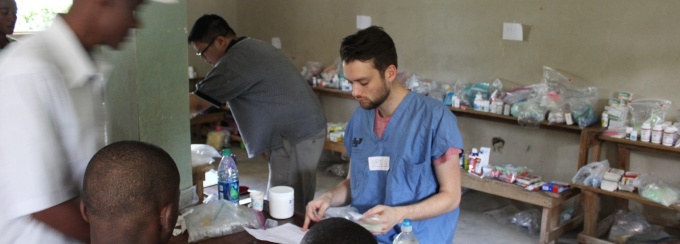FMD890G Global Medicine

Medical students filling prescriptions in the pharmacy in Haiti.
International health rotations are an amazing opportunity for medical students. In addition to immersing yourself in a new culture, you will learn how different medical systems work, gain experience providing medical care and so much more.
This elective will allow senior medical students to work under supervision in selected clinical sites in developing countries.
The purpose is to require practice in settings where students must rely on fund of knowledge, history, and examination with minimal technological support.
Students will be incorporated into the clinical team and provide, under supervision, a broad range of ambulatory and inpatient care.
Students will:
- enhance skills in diagnosis of undifferentiated presenting complaints
- improve their judgment with respect to use of diagnostic and therapeutic procedures
- develop an appreciation for social, cultural, and economic factors in the presentation, etiology, course, and management of illness
- improve their sensitivity to health consequences of public policy and economics
- sharpen their understanding of preventive intervention from a public health perspective
- increase consciousness of cost implications of clinical decisions
Course Director

Clinical Associate Professor; Director of Global Health Education, Department of Family Medicine; Associate Program Director, Interim Medical Director and Associate Clinical Chief, ECMC Family Medicine
ECMC Family Health Center 462 Grider Street Buffalo, NY 14215
Phone: 716-898-4278; Fax: 716-898-5719
Email: dholmes@buffalo.edu
Planning Your Experience
Where do you want to go?
- Do you have a country, continent, climate, or terrain in mind?
- Do you want to work in a rural or urban setting?
- Do you want to learn or better your foreign language skills?
What do you want to do?
- Are you interested in primary care or a specialty? How about public health?
- Do you want to teach or conduct research?
- Would you enjoy immersive language training?
When do you want to go?
- Fall would be a great way to stand out at residency interviews!
- Looking to get away from the snow and cold? Winter would be perfect!
- A trip in the Spring would be a fantastic way to wrap up medical school!
With whom do you want to go?
- Do you want to travel with family?
- Or would you rather go with your friends?
- Do you prefer solo travel?
What kind of organization?
- Are you looking for a secular or faith-based organization?
- Do you want to rotate at a foreign university or hospital?
- Do you have a personal contact in an exotic location?
How will you fund your trip?
- Student loans?
- Scholarships?
- Fundraising?
Before Your Experience
- Decide where you want to go and with which organization. Complete the application for that organization.
- Register for FMD890-G.
- Complete the Out-of-Town Elective Form.
- Review and sign the UB Liability Waiver.
- Make the necessary preparations:
- Procure or update your passport and visa (if needed)
- Get immunizations, malaria prophylaxis, diarrhea medication, bug spray with DEET, etc.
- Review the CDC Travel Guidelines.
- Review the State Department recommendations for Students Abroad.
- Obtain supplemental health and evacuation insurance.
- Meet with Dr. Holmes for a “Briefing Session” one to two months before you depart.
During Your Experience
- If you have access to email, please send Dr. Holmes a message after you arrive at your destination.
- Have a great trip and keep a journal reflecting on your experiences while overseas.
- Have your preceptor complete your grade form (in English, please).
After Your Experience
- Email Dr. Holmes when you return to the U.S. and schedule a debriefing meeting with him.
- Write a reflection of your experience (minimum of 500 words) for interested students, faculty and staff to read. Your reflection needs to include the following:
- A description of some of your experiences, both negative and positive, and how you felt about them.
- A summary of what you learned and what you think you’ll remember from the experience 30 years from now.
- Four to eight color pictures with captions describing what’s going on and/or who is pictured. Please include at least two pictures on the first page).
- Meet with Dr. Holmes for a debriefing session after your return.
- Discuss your experiences and what you learned from it personally and professionally.
- Give Dr. Holmes your reflection paper and show him some pictures from your trip.
- Turn in the grade form (completed by your preceptor) and evaluation form (completed by you).
- Consider giving a presentation on your experience to fellow medical students and other interested people.